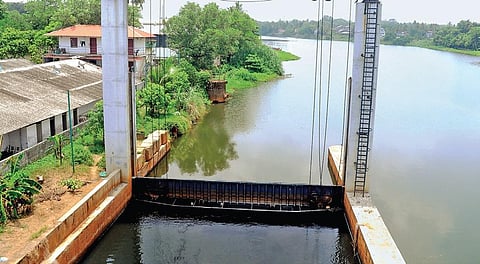No respite for Periyar from pollution despite lockdown
KOCHI: The nationwide lockdown came as a boon for India’s major rivers like the Ganga and Yamuna as their water quality improved significantly. However, the same cannot be said for Periyar river, a major drinking water source of the city and the means of livelihood for hundreds of fishermen living downstream. On Friday, the river water near the Irrigation Department shutters at Eloor turned black and emitted a rotten egg smell, angering environmental activists and residents.
Shabeer O V, member, Jana Jagratha, said several companies were functioning at Eloor during the lockdown. “We approached the Pollution Control Board (PCB) engineer only to be told that the PCB office was closed as it did not come under the essential services category,” he said. He said following the demands of residents and environmental activists, PCB officials arrived at the spot and collected samples. “However, everything ends with sample collection,” alleged Shabeer.
An official with the Department of Industries and Commerce, Ernakulam, said not all industries were functioning in the area. “Only those deemed essential, like soap manufacturers units, food-related industries, sanitiser manufacturing units and those producing chemicals like sulphur for use in other essential industries, are functioning,” said the official, adding that some companies whose products are exported started operations just two days ago after obtaining a clearance from the state government.
‘Blackening happens every summer’
PCB engineer P B Sreelakshmi said the blackening of water happens every summer and the blame could not be entirely pinned on effluents from industries. “Water near the shutters and upstream turns black when the natural flow of river gets blocked. Though we have, in several letters, urged the Irrigation Department to implement a procedure to raise the shutters regularly, it has been ignoring our requests,” Sreelakshmi said.
She said tests of the river’s water quality in the area had revealed that oxygen level was nil near the riverbed. “When this happens, micro-organisms in the river switch to anaerobic respiration, which leads to the formation of hydrogen sulphide, the reason for the rotten egg smell,” she said. Sreelakshmi said to find whether effluents were being pumped, weeds growing along the stretch needed to be removed. “Inspection is needed to check whether underwater effluent pipelines have been laid,” she said.
Irrigation Dept’s rebuttal
The Irrigation Department rubbished the PCB’s allegations. “We have been raising the shutters two to three times daily,” said Sajeed Mohammed, engineer, Irrigation Department. On Saturday, the shutters will be raised at 11:40am, he said. However, there were limitations to opening the shutters, he said. “The shutters can’t be raised as per one’s whims and fancies. It needs to be done scientifically. Shutters are opened based on high tide and low tide as there is a risk of the incursion of saline water,” he said.

